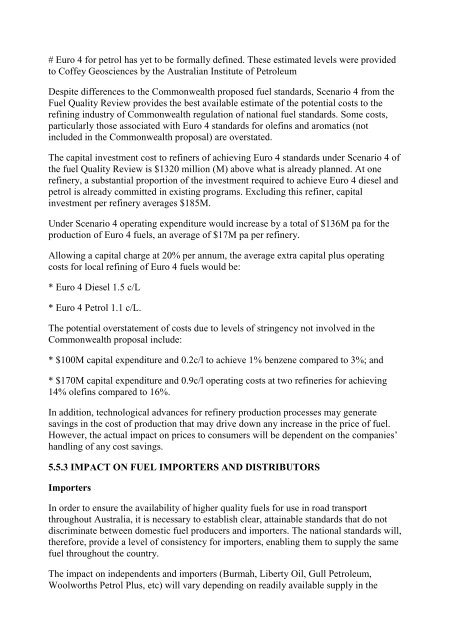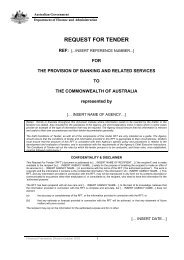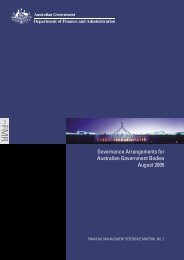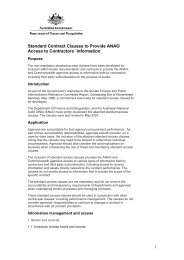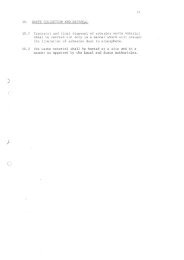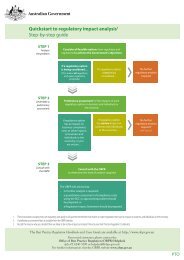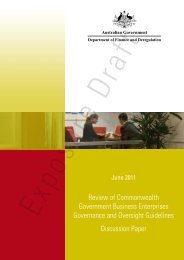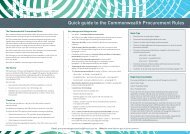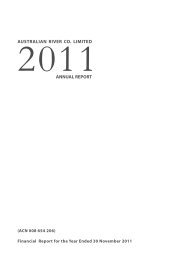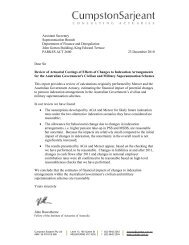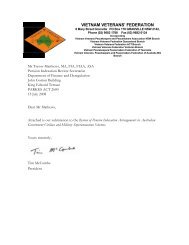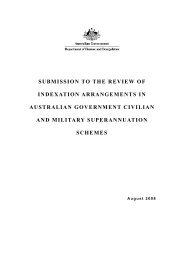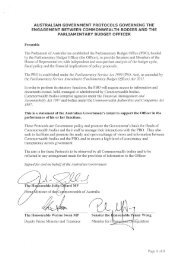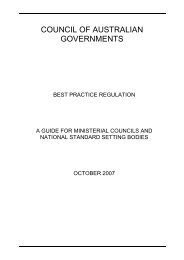National Fuel Quality Standards Regulation Impact Statement 1 ...
National Fuel Quality Standards Regulation Impact Statement 1 ...
National Fuel Quality Standards Regulation Impact Statement 1 ...
Create successful ePaper yourself
Turn your PDF publications into a flip-book with our unique Google optimized e-Paper software.
# Euro 4 for petrol has yet to be formally defined. These estimated levels were provided<br />
to Coffey Geosciences by the Australian Institute of Petroleum<br />
Despite differences to the Commonwealth proposed fuel standards, Scenario 4 from the<br />
<strong>Fuel</strong> <strong>Quality</strong> Review provides the best available estimate of the potential costs to the<br />
refining industry of Commonwealth regulation of national fuel standards. Some costs,<br />
particularly those associated with Euro 4 standards for olefins and aromatics (not<br />
included in the Commonwealth proposal) are overstated.<br />
The capital investment cost to refiners of achieving Euro 4 standards under Scenario 4 of<br />
the fuel <strong>Quality</strong> Review is $1320 million (M) above what is already planned. At one<br />
refinery, a substantial proportion of the investment required to achieve Euro 4 diesel and<br />
petrol is already committed in existing programs. Excluding this refiner, capital<br />
investment per refinery averages $185M.<br />
Under Scenario 4 operating expenditure would increase by a total of $136M pa for the<br />
production of Euro 4 fuels, an average of $17M pa per refinery.<br />
Allowing a capital charge at 20% per annum, the average extra capital plus operating<br />
costs for local refining of Euro 4 fuels would be:<br />
* Euro 4 Diesel 1.5 c/L<br />
* Euro 4 Petrol 1.1 c/L.<br />
The potential overstatement of costs due to levels of stringency not involved in the<br />
Commonwealth proposal include:<br />
* $100M capital expenditure and 0.2c/l to achieve 1% benzene compared to 3%; and<br />
* $170M capital expenditure and 0.9c/l operating costs at two refineries for achieving<br />
14% olefins compared to 16%.<br />
In addition, technological advances for refinery production processes may generate<br />
savings in the cost of production that may drive down any increase in the price of fuel.<br />
However, the actual impact on prices to consumers will be dependent on the companies’<br />
handling of any cost savings.<br />
5.5.3 IMPACT ON FUEL IMPORTERS AND DISTRIBUTORS<br />
Importers<br />
In order to ensure the availability of higher quality fuels for use in road transport<br />
throughout Australia, it is necessary to establish clear, attainable standards that do not<br />
discriminate between domestic fuel producers and importers. The national standards will,<br />
therefore, provide a level of consistency for importers, enabling them to supply the same<br />
fuel throughout the country.<br />
The impact on independents and importers (Burmah, Liberty Oil, Gull Petroleum,<br />
Woolworths Petrol Plus, etc) will vary depending on readily available supply in the


